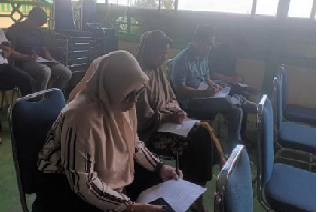Education on the Halal Certification Process of Food and Beverage Products at Village-Owned Enterprises
Abstract
Halal certification is an important issue for business actors, because in the future every food and beverage product must have a halal certificate. Village-Owned Enterprises (Bumdes) is a business entity owned by the village and aims to develop various business products based on the existing resources in the village. Mattabulu Village, Lalabata District, Soppeng Regency, is one of the villages that has an active and accomplished Bumdes. Unfortunately, most of the food and beverage products produced by Bumdes do not have halal certificates. This service is carried out to increase the knowledge and skills of Bumdes Pada Ati members in Mattabulu Village to administer halal certificates for the food and beverage products they produce. This service is carried out using the education and training method, which begins with observing the needs of the target partners. The training was carried out effectively to increase participants' knowledge about halal certification in the good category, from 45% to 95%. As well as receiving good testimonials from participants as well as village officials and partners. It is hoped that the halal certificate will increase the competitiveness of food and beverage products produced by target partners.
References
Agustina Y., Pratikto H., Churiyah M., & Dharma B. A. (2019). Pentingnya Penyuluhan Sertifikasi Jaminan Produk Halal Untuk Usaha Kecil Menengah (UKM). 1(2). http://dx.doi.org/10.17977/um078v1i22019p139-150
Anonim. (2020). Profil Desa Mattabulu. https://mattabulu.desa.id/tentang-desa/.
Asa. (2019). An overview of the developments of Halal Certification Laws in Malaysia, Singapore, Brunei and Indonesia. Jurnal Syariah, 27. https://doi.org/10.22452/https://doi.org/10.22452/js.vol27no1.7
Basri Y. Z. & Kurniawati F. (2019). Effect of religiosity and halal awareness on purchase intention moderate by halal certification. International Conference on Economics, magement and Accounting (ICEMA), (hal. 592-607). https://doi.org/10.18502/kss.v3i26.5403
Bux C., Varese E., Amiracelli V., & Lombardi M. (2022). Halal food sustainability between certification and blockchain : A Review. Sustainability, 14(4), 2152. https://doi.org/10.3390/su14042152
Esfandiari F., Al-Fatih S., & Nasera F. A. (2021). Pendampingan Akad dan Sertifikasi Halal MUI serta Edukasi Jaminan Produk Halal pada Minuman Cangloh Mergosono Kota Malang. 1(2). https://doi.org/10.22219/jdh.v1i2.17607
Hamid A., Said M., & Meiria E. (2019). Potency and prospect of Halal Market in global industry : an empirical analysis of Indonesia and United Kingdom. Business and Management Studies, 5(2), https://doi.org/10.11114/bms.v5i2.4167.
Katuk N., Ku-Muhammad K. R. , Kayat K., Hamid M. N. A., Zakaria N. H., & Purbasari A. (2021). Halal sertification for tourism marketing : the attributes and attitudes of food operators in Indonesia. Journal of Islamic Marketing, 12 (5), 1043-1062. https://doi.org/10.1108/jima-03-2020-0068
Muhammad A. A., Ab Rahman M. W., Mohd Hamzah F., Che Mohd Zaid & Zailani S. (2019). The impact of consumption value on consume behavior : A case study of halal-certified food supplies. British Food Journal, 121 (11), 2951-2966. http://dx.doi.org/10.1108/BFJ-10-2018-0692
Nawir M., Taskirawati I., & Baharuddin. (2017). Pemanfaatan Tanaman Pangi (Pangium Edule Reinw) pada Lahan Agroforestri Desa Watu Toa Kecamatan Marioriwawo Kabupaten. Jurnal Hutan dan masyarakat, 9(2), 123-170. https://doi.org/10.24259/jhm.v9i2.3039
Puspita N. F., Hamzah A., Zuchrillah D. R., & Karisma A. D. (2021). Pendampingan Menuju Sertikasi Halal pada Produk "Socolat" UMKM Pondok Modern Sumber Daya At-Taqwa. 5(1). https://doi.org/10.31284/j.jpp-iptek.2021.v5i1.1611
Qomaro G. W., Hammam & Nasik K. (2019). Pemberdayaan Usaha Mikro Kecil dan Menegah Sektor Pangan dalam Meningkatkan Perekonomian Lokal Mellaui Pendampingan Sertifikasi Halal di Kecamatan Tragah Bangkalan. 52. https://doi.org/10.21107/pangabdhi.v5i2.6116
Secinaro S., Radwan M., Calandra D., & Biancone P. (2021). Halal certification impact on Firms' corporate social responsibility disclosure : evidence from the food and beverages sector in Italy. Corporate Social Responsibility and Environmental Management, 28 (4), 1376-1385. https://doi.org/10.1002/csr.2161
Siregar, M., Sofyaningsih, M., & Linda, O. (2024). Pelatihan Produksi Pangan Halal dan Thoyyib sebagai Persiapan Sertifikasi Halal di SMKN 1 Menggala Lampung. Jurnal Abdi Masyarakat Kita, 4(1), 61-74.
Sofiana R., Utami S., & Rohim A. (2021). The problems of halal sertification regarding consumer protection in Malaysia and Indonesia. Journal oh Human Rights, Culture and Legal System, 1(3), 176-189. https://doi.org/10.53955/jhcls.v1i3.16
Suzery M., Widayat, Cahyono B., & Al-Baarri. (2019). Proses Perbaikan Produksi dalam Pendampingan Sertifikasi Halal bagi Paguyuban Usaha Kuliner. Indonesian Journal of Halal, 2(2). https://doi.org/10.14710/halal.v2i2.7892
Widayat W., Sulardjaka S., Al-Baarri A. N., & Nurjannah R. (2020). Pendampingan Sertifikasi Halal pada UMKM Hanum Food. Indonesian Journal of Halal, 3(1). https://doi.org/10.14710/halal.v3i1.9189
Widayat, Hadiyanto, Al-Baarri, & Putri. (2020). Pendampingan Sertifikasi Laik Sehat Makanan Bagi Restoran Selaras Dalam Rangka Persiapan Sertifikasi Halal. Indonesian Journal of Halal, 2(2). https://doi.org/10.14710/halal.v2i2.7933
Yuwana, S. I. P., & Hasanah, H. (2021). Literasi produk bersertifikasi halal dalam rangka meningkatkan penjualan pada UMKM. Jurnal Pengabdian Masyarakat Madani (JPMM), 1(2), 104-112.

Copyright (c) 2024 Yessy Kurniati, Nurhaedar Jafar, Nurzakiah Hasan, Marini Amalia, Nurzakiah Hasan, Rosdiana Rosdiana

This work is licensed under a Creative Commons Attribution-NonCommercial-ShareAlike 4.0 International License.
